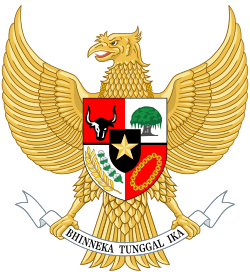Bhinneka Tunggal Ika
Bhinneka Tunggal Ika is the official national motto of Indonesia. The phrase is Old Javanese translated as "Unity in Diversity" (Out of many, one).[1] It is inscribed in the Indonesian national symbol, Garuda Pancasila (written on the scroll gripped by the Garuda's claws), and is mentioned specifically in article 36A of the Constitution of Indonesia. The name of Garuda is inspired by a mythical bird, the mount of Lord Vishnu and the Buddhist gold bird king, King Garuda.

It is a quotation from an Old Javanese poem Kakawin Sutasoma, written by Mpu Tantular during the reign of the Majapahit empire sometime in the 14th century, under the reign of King Rājasanagara, also known as Hayam Wuruk. Kakawin contains epic poems written in metres.
This poem is notable as it promotes tolerance between Hindus (especially Shivaites) and Buddhists.[2]
Full stanza
Original
This quotation comes from canto 139, stanza 5. The full stanza reads as follows:
Hæng dhâtu winuwæs Buddha Wiswa,
Bhinnêki rakwa ring apan kena parwanœsen,
Nangda khong Jinatuaa khlawan Hokwatatwa tunggal,
Bhinneka tunggal ika tæng hana dharma mangrwa.
Translation
It is said that the well-known Buddha and Shiva are two different substances.
They are indeed different, yet how is it possible to recognise their difference in a glance,
since the truth of Jina (Buddha) and the truth of Shiva is one.
They are indeed different, but they are of the same kind, as there is no duality in Truth.
This translation is based, with minor adaptations, on the critical text edition by Soewito Santoso.[1]
See also
- E pluribus unum
- Motto of the European Union
- 2018 Asian Games's official mascots, Bhin Bhin, Atung and Kaka, which are named after the motto.
References
- Santoso, Soewito Sutasoma, a Study in Old Javanese Wajrayana 1975:578. New Delhi: International Academy of Culture
- Depkumham.go.id Archived 12 February 2010 at the Wayback Machine
